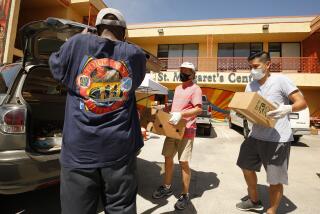Make Blood Donation Easier
- Share via
Re “Hospitals Face Dire Shortage of Blood,” July 15: I have been donating blood for more than 40 years--regularly, when I worked for companies that brought in a Red Cross bloodmobile two or more times a year; and occasionally, when I worked for smaller firms. While other services have adapted to accommodate the customer, the Red Cross blood banks have seemed to stay the same: The dreary tables where donors lie remain hard and narrow. The impersonal station-to-station herding of donors was changed only by the addition of more intrusive and insulting questioning. The transfer of blood remains a grin-and-bear-it experience. A donor must really be motivated to go through the ordeal. I have given blood for friends and relatives at hospitals where the donors are treated like patients and made comfortable in reclining chairs, where innovations in blood collection seemed to reduce the inevitable discomfort.
Every six months, after I have my teeth cleaned, I make an appointment for my next cleaning. The Red Cross apparently doesn’t do such advance scheduling. I can go to my dentist any day of the work week, yet my community’s blood bank seems to be in operation only one or two afternoons a week. I got a call not too long ago from a Red Cross blood-donation solicitor who implored me to give a pint of my Type O blood. He told me to come in on Thursday afternoon. When I told him I was unavailable on that day, rather than referring me to another facility, he indicated that he would put me on the list for the next time around. Is that any way to reduce the blood shortage?
John Gobble
Santa Clarita
The Torrance Red Cross has cut back the days of the week on which donors can give blood from six to three. It takes an hour or longer in the facility, even when there are few donors, though the blood-giving itself takes less than 10 minutes. They must make it easier, quicker and more pleasant for blood donors so that more people would give and regulars would give more frequently.
Robert Rothman
Rolling Hills
Before blood transfusions became a covered benefit under health insurance plans, patients undergoing elective surgery were required to arrange for blood donors prior to entering the hospital to cover the anticipated need for transfusions. Blood that was not used was then made available for the general pool. Resuming this practice would serve to alleviate the present shortage of blood.
Richard A. Braun MD
Encino


